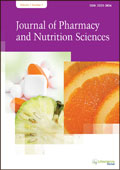jpans
|
|
Editorial Download Full Article |
|
|
Abstract: There is a high and steadily increasing prevalence of respiratory allergy throughout the world, especially in paediatric population and in industrialized and developing countries. A complex interplay between genetic and environmental factors has been implicated to explain this dramatic increase in prevalence of allergic diseases. It has been suggested that exposure to microbes plays a critical role in the development of the early immune system and may contribute to allergic diseases through their effect on mucosal immunity. Probiotics, microorganisms exerting beneficial effects on the host, are used in a great number of paediatric and adult diseases, mainly gastrointestinal disorders, but they have been proposed to be beneficial also in allergic diseases. Different trials have been published finding benefits in the use of probiotics in prevention and treatment of atopic dermatitis, but to date, studies have yielded inconsistent findings to support a protective association between their use on prevention of allergic rhinitis or asthma. However, probiotics may be beneficial in improving symptoms and quality of life in patients with allergic rhinitis although it remains limited due to study heterogeneity and variable outcome measures. As a result of these controversies, future investigations with a better standardization are needed. In this review, we summarize recent clinical research to elucidate the mechanisms of probiotics and their effect in respiratory allergy. According to published data, probiotics could emerge as a novel, complementary treatment option for allergic rhinitis but not for asthma. Keywords: |
|
|
Abstract: Probiotics are increasingly recognized as capable of modulating immune responses. Some probiotic strains show the potential of inducing a different lymphocyte polarization, promoting the Th1 phenotype and inhibiting, at the same time, the allergy-prone Th2 phenotype. On this basis, we could expect that probiotics may act synergistically to improve the clinical efficacy of sublingual allergen immunotherapy (SLIT). In this study, 30 patients affected by allergic rhinitis undergoing SLIT, were concomitantly administered a probiotic supplement (n = 14) or not (n = 16), according to their preference. Nasal symptom score, rescue medication score and ‘well-days’ were evaluated after 2 and 4 months of treatment. Patients who were administered SLIT plus probiotics showed a trend toward reduction of the nasal symptoms (-7.1%, p = ns) with a significant reduction of medication score (-32.6, p = 0.02) and an increase of ‘well-days’ (35.1, p = 0.02). These preliminary data, from a small study population, suggest that this combined approach with SLIT and probiotics could result in an increased efficacy of the SLIT treatment. Keywords: |
|
|
Abstract: Background: Atopic dermatitis is a disease with a lot of clinical interest because it is the point of attachment between allergic diseases and autoimmune diseases. Probiotics and synbiotics favor the expression of anti-inflammatory Th1 cytokines which produces therapeutic benefits in patients with atopic dermatitis as revealed by recent meta-analysis. Material and Method: Six patients (3 women and 3 men) suffering from moderate atopic dermatitis aged between 16 and 28 years were treated with Bifidobacterium lactis BS01, Lactobacillus rhamnosus LR05 and prebiotic fructo -oligosaccharides (2x109CFU) once daily in a period of four months added to their previously scheduled topical treatment. SCORAD index and atopic dermatitis quality of life test (QoLIAD) prior to treatment and four months after treatment were analyzed. Results: After 4 months of treatment we objectified clinical improvement by reducing the SCORAD index (average of 6 points) and better results in QoLIAD test in 5 of the 6 patients. Previously scheduled medical treatment remained unchanged and no side effect was observed in any of the patients treated. Discussion: Most of our patients treated obtained clinical improvement and in quality of life without adverse effects, this fact support the results of recent papers concluding that the use of probiotics in diary clinical practice is a safe coadyuvant and possibly effective in the treatment of atopic dermatitis. Keywords: |
|
|
Abstract: Probiotics are live microorganisms which when administered in adequate amounts, may confer a health benefit on the host. Stimulation and regulation of immune system is among well documented benefits claimed for probiotics. Both innate and adaptive immune system can be regulated by these microorganisms. Effects of probiotics on immune system are significantly dependent on the strain, dosage and the investigated condition. In this article the mechanisms through which probiotics may regulate immune system were reviewed. These mechanisms are consist of blockage of adhesion sites for pathogenic bacteria, competition for nutrients, production of inhibitory compounds, degradation of the toxin receptors in the mucosa membrane, activation of phagocytic and natural killer cells as well as regulation of cellular and humoral immunity. Also the immune-related diseases including immune deficiency (Acquired immunodeficiency syndrome) and hypersensitivity (allergy, inflammatory bowel disease, diabetes mellitus type 1 and rheumatoid arthritis) were discussed Keywords: |


